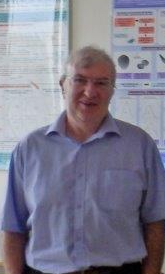Notes: Chair of Theoretical Chemistry, Professor of Chemistry and Surface Physics at the Institut Pascal, Clermont University
 Where has your journey in languages taken you?
Where has your journey in languages taken you?
Having grown up in Aberystwyth with Scottish and French parents, I left Penglais school for Trinity College, Cambridge to read Natural Sciences. Leisure activities included Rugby and theatre. After graduating, I attended a year's postgraduate course in Nancy, France, with every intention of returning to UK to study for a PhD. However, I remained in France and wrote a 'These d'Etat' thesis in French on molecule-solid surface interaction theory. I still live in France.
My first permanent job was Lecturer at the University of Caen in Normandy, with responsibility for the practical side of chemistry. I now hold the Chair for Theoretical Chemistry at Clermont University in France.
What part have languages played in your life?
A tremendously important part! I grew up speaking French and English, whilst Welsh was mandatory in primary and secondary school up to the age of 16. I also took up German from S3-S4 and three of us decided to do a crash A-Level course in Russian at Penglais Comprehensive School. The ability to translate from French to English was of immediate use in France, since I funded much of my doctorate by translating or correcting scientific manuscripts in English. Russian was useful, since Nancy set up exchanges with Russian speakers from Kiev. I also provided simultaneous translation for a scientific conference. Since my job requires teaching in French, my professional life is essentially describing chemistry in French. In research, there has been much movement among Russian scientists, including towards France. In solid state physics, there are many such experts, some of whom prefer to speak Russian than English. This has meant I have made regular use of my Russian, both in France and on trips to Russia and Ukraine. Russian is also helpful for work in other similar languages, such as a fellowship to the Slovak academy of Sciences. In Poland and Hungary, German has been more useful.
What would you say to those who feel we do not need to learn any other language, that English is enough?
Although sciences are my main field, the use of other languages has played a pivotal role in my career – especially Russian and German. In my personal life, French has allowed me to settle in France. When abroad on conferences, it is much appreciated when I have a few phrases in the language of the host country, even if I do not speak it fluently e.g. I have had a go with Spanish and Italian, which are close enough to French to understand but I need preparation to speak it well. I have also had a go at Turkish, Slovak, Ukrainian, Polish and a very few words in Hungarian –but these languages have been too tough to really master! I need more time!
Return to Job Profiles